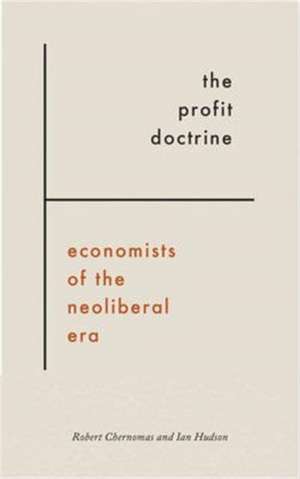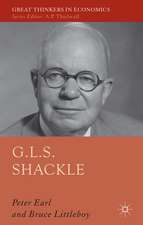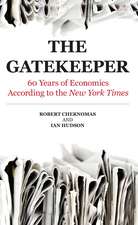The Profit Doctrine: Economists of the Neoliberal Era
Autor Robert Chernomas, Ian Hudsonen Limba Engleză Paperback – 19 dec 2016
The profession of economics has a lot to answer for. Since the late 1970s, the ideas of influential economists have justified policies that have made the world more prone to economic crisis, remarkably less equal, more polluted, and less secure than it might be. How did ideas and policies that have proved to be such an abject failure come to dominate the economic landscape?
By critically examining the work of the most famous economists of the neoliberal period including Alan Greenspan, Milton Friedman, and Robert Lucas, Robert Chernomas and Ian Hudson demonstrate that many of those who rose to prominence did so primarily because of their defense of, and contribution to, rising corporate profits, rather thantheir ability to predict or explain economic events.
An important and controversial book, The Profit Doctrine exposes the uses and abuses of mainstream economic canons, identifies those responsible, and reaffirms the primacy of political economy.
By critically examining the work of the most famous economists of the neoliberal period including Alan Greenspan, Milton Friedman, and Robert Lucas, Robert Chernomas and Ian Hudson demonstrate that many of those who rose to prominence did so primarily because of their defense of, and contribution to, rising corporate profits, rather thantheir ability to predict or explain economic events.
An important and controversial book, The Profit Doctrine exposes the uses and abuses of mainstream economic canons, identifies those responsible, and reaffirms the primacy of political economy.
Preț: 208.30 lei
Nou
Puncte Express: 312
Preț estimativ în valută:
39.87€ • 43.32$ • 33.51£
39.87€ • 43.32$ • 33.51£
Carte tipărită la comandă
Livrare economică 21 aprilie-05 mai
Preluare comenzi: 021 569.72.76
Specificații
ISBN-13: 9780745335858
ISBN-10: 0745335853
Pagini: 256
Dimensiuni: 140 x 222 x 20 mm
Greutate: 0.32 kg
Editura: PLUTO PRESS
Colecția Pluto Press
ISBN-10: 0745335853
Pagini: 256
Dimensiuni: 140 x 222 x 20 mm
Greutate: 0.32 kg
Editura: PLUTO PRESS
Colecția Pluto Press
Notă biografică
Robert Chernomas is professor of economics at the University of Manitoba and coauthor of Social Murder and Other Shortcomings of Conservative Economics, The Gatekeeper: Sixty Years of Economics according to the “New York Times”, and To Live and Die in America: Class, Power, Health, and Health Care. Ian Hudson is professor of economics at the University of Manitoba and coauthor of Economics in the Twenty-first Century: A Critical Perspective
Cuprins
1. Prophets and Profits
2. The Contest of Economic Ideas: Survival of the Richest
3. The Consequences of Economic Ideas
4. Milton Friedman: The Godfather of the Age of Instability and Inequality
5. The Deregulationists: Public Choice and Private Gain
6. The Great Vacation: Rational Expectations and Real Business Cycles
7. Bursting Bubbles: Finance, Crisis, and The Efficient Market Hypothesis
8. Economists Go to Washington: Ideas in Action
9. Conclusion: Dissenters and Victors
Bibliography
Index
2. The Contest of Economic Ideas: Survival of the Richest
3. The Consequences of Economic Ideas
4. Milton Friedman: The Godfather of the Age of Instability and Inequality
5. The Deregulationists: Public Choice and Private Gain
6. The Great Vacation: Rational Expectations and Real Business Cycles
7. Bursting Bubbles: Finance, Crisis, and The Efficient Market Hypothesis
8. Economists Go to Washington: Ideas in Action
9. Conclusion: Dissenters and Victors
Bibliography
Index
Recenzii
"The financial crisis alerted the public to what some insiders have known for decades: mainstream economic ideas are seriously flawed. Chernomas and Hudson lay bare both the ideas and the equally flawed individuals behind them, from Milton Friedman to the ex-'Maestro', Alan Greenspan."
"In lucid and accessible prose, The Profit Doctrine shows how the post-war evolution of economic ideas has systematically favored the profitability of big business over the interests of everyday people. Chernomas and Hudson provide a step-by-step explanation of how highly abstract models and methods have provided intellectual cover for policies that have led both to increasing inequality and to profound economic crises."

















